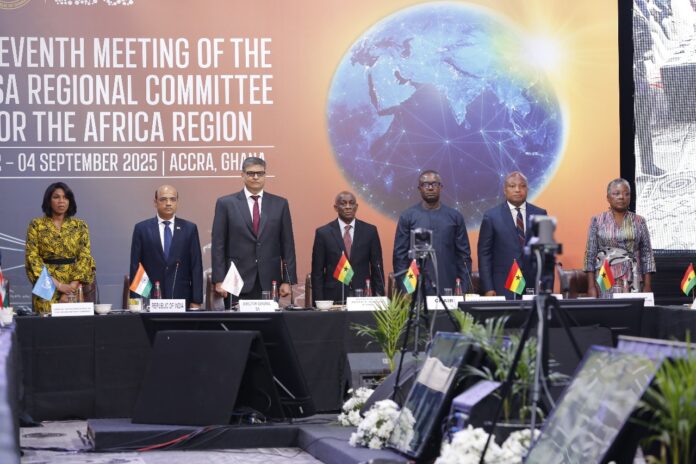Ghana’s power supply system is now stable, with surplus energy being exported, the Minister of Energy and Green Transition, John Abdulai Jinapor, has said, adding that efforts are being made to achieve universal electricity access.
“Our power supply is fairly stable. We have enough, and we are even exporting. Our vision is to have a minimum of 10 per cent of our energy mix emanating from renewables, and that even excludes our high-flow potential. Immediately, what we want to set forth is to work to deploy solar irrigation pumps across the country,” he added.
The minister disclosed this at a press briefing at the 7th Meeting of the International Solar Alliance (ISA) Regional Committee for the Africa Region in Accra, on September 4.
The summit, which started on September 2 and ended on September 4, was attended by 19 Energy and Power Ministers from across Africa.
They included Malawi, Liberia, Seychelles, Comoros, Nigeria, The Gambia, Somalia, and SaoTome and Principe, and representatives from 39 member countries and 7 signatory nations.
Among issues discussed were actionable strategies for energy access, solar innovation, and climate-resilient growth.
Solar pumps
The minister also said that the government was planning to deploy solar irrigation pumps across the country to support year-round farming, especially during the dry season.
“India has pioneered it, and we want to learn from them.
They have agreed that they will collaborate with us,” he said, adding that an MoU would be signed to that effect and would include the training of artisans.
Energy gaps
Earlier at the summit, Mr Jinapor highlighted Africa’s deepening energy crisis and said over 600 million Africans lacked electricity access, with nearly one billion people lacking clean cooking solutions, especially in rural areas.
He said, despite being the sunniest continent, Africa generates only four per cent of global solar power and receives less than two per cent of global clean energy investment.
“Africa’s energy inequity extends far beyond infrastructure. It reflects underinvestment, unequal access and structural barriers that hinder our progress.
“Without affordable, clean, and reliable energy, our ambitions, industrialisation, job creation, food security, and climate resilience will remain out of reach.
“Universal access to energy is not merely a development goal, it is a moral imperative and central to realising Sustainable Development Goal Seven by 2030,” the minister said.
He further emphasised the importance of innovative and practical solutions such as Floating Solar Photovoltaics (FSPV) to address Africa’s energy crisis.
Mr Jinapor said Africa’s energy transition must go beyond megawatts to empower communities and secure resources for sustainable development.
Ratification
The Director-General of ISA, Ashish Khanna, said the organisation comprised 124 member countries.
He said the meeting ratified the launch of the Africa Solar Facility, a $200 million catalytic fund—$75 million of which would be operational by the end of 2025 to unlock over $800 million in private-sector investment for decentralised renewable energy, beginning in Nigeria.
Additionally, Mr Khanna said ISA would establish 12 solar technology education resource centres across Africa, including one in Ghana, to provide technical training, testing labs, and youth incubation to foster local expertise and innovation in solar energy.
CNR



